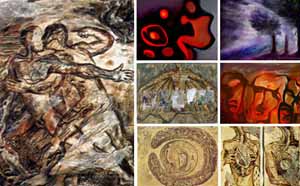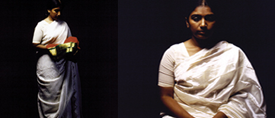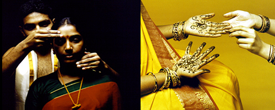http://www.chass.utoronto.ca/~tamils/tsc2008!
Third Annual Tamil Studies Conference | May 15 - 17, 2008 |
Toronto, Canada! Being Human; Being Tamil: Personhood, Agency and Identity!
Welcome
 The Centre for South Asian Studies at the University of Toronto and the
University of Windsor jointly host "Being Human; Being Tamil: Personhood,
Agency and Identity," the third annual Tamil Studies Conference from May
15-17, 2008. This conference will bring together Tamil Studies scholars from
North America, Europe, South Asia, and Australasia. Over 50 scholars, writers
and artists from disciplines ranging from Anthropology, Dance Studies,
Diaspora Studies, Environmental Studies, History, Literature, Psychology,
Religion, and Sociology will present papers. The Centre for South Asian Studies at the University of Toronto and the
University of Windsor jointly host "Being Human; Being Tamil: Personhood,
Agency and Identity," the third annual Tamil Studies Conference from May
15-17, 2008. This conference will bring together Tamil Studies scholars from
North America, Europe, South Asia, and Australasia. Over 50 scholars, writers
and artists from disciplines ranging from Anthropology, Dance Studies,
Diaspora Studies, Environmental Studies, History, Literature, Psychology,
Religion, and Sociology will present papers.
Panel Spotlight:
Ram Mahalingam
Assistant Professor
Department of Psychology
University of Michigan
E/ ramawasi@umich.edu
Chair, "Cultural Psychology of Gender and Psychological Well-Being of Tamil
Immigrants"
"Super Amma": Idealized Representations of Tamil Motherhood Among Tamil
Immigrant Women (w/ Sundari Balan)
"Pure" Woman ideal and the Silencing of
Sexually Abused Women: Clinical Implications (w/ Shanta Kanukollu)
Brown Masculinities and the Contours of
Resistance to Hegemonic White Masculinities: Implications for Psychological
Well-being (w/ Jennifer Yim)
 This panel explores three areas (1) beliefs about manhood and womanhood,(2)
gender role conflict and(3) sexual abuse in Tamilnadu and among Tamil
immigrants in the United States, with a specific focus on psychological
well-being. Using interviews and survey research, these papers examine how
differences in Tamils' versus Whites' understanding what it means to be male
or female affect the psychological well-being of men and women. Although
anthropological and feminist research on gender has examined how factors such
as globalization have shaped the construction of Tamil notions of ideal
womanhood and manhood, very few psychological studies examine how Tamil
immigrants to the US come to have such beliefs, and how these beliefs affect
their lives. These three papers focus on how Tamil immigrant men and women
revise their ideas of the ideal man and the ideal woman and how this process
of reconstruction affects their psychological well-being (e.g., risk taking,
coping and help seeking). These papers investigate how the hegemony of
“Whiteness” shapes the experience of gender at the intersections of ethnicity
and social class. This panel explores three areas (1) beliefs about manhood and womanhood,(2)
gender role conflict and(3) sexual abuse in Tamilnadu and among Tamil
immigrants in the United States, with a specific focus on psychological
well-being. Using interviews and survey research, these papers examine how
differences in Tamils' versus Whites' understanding what it means to be male
or female affect the psychological well-being of men and women. Although
anthropological and feminist research on gender has examined how factors such
as globalization have shaped the construction of Tamil notions of ideal
womanhood and manhood, very few psychological studies examine how Tamil
immigrants to the US come to have such beliefs, and how these beliefs affect
their lives. These three papers focus on how Tamil immigrant men and women
revise their ideas of the ideal man and the ideal woman and how this process
of reconstruction affects their psychological well-being (e.g., risk taking,
coping and help seeking). These papers investigate how the hegemony of
“Whiteness” shapes the experience of gender at the intersections of ethnicity
and social class.
The first paper examines how, dominant culture (White) ideas about what it
means to be a man shape second generation Tamils' ideas about their own
maleness, and how these 'brown masculinities' negotiate, challenge and resist
White notions of manhood. Balan and Mahalingam's paper looks at how Tamil
immigrants adopt positive stereotypes of Asian American men and women to
create a positive group identity. Kanukollu and Mahalingam's paper contrasts
and connects the idealized beliefs of Tamil womanhood that valorizes the
"pure" Tamil woman with how sexually abused women are silenced and set apart
within the larger Tamil immigrant community. All three papers will discuss the
mental health consequences of internalizing idealized beliefs about
masculinity and femininity for Tamil immigrants.
- Prof. Mahalingam’s research primarily focuses on how the relationship
between social marginality and intersecting social identities shape
psychological well being. He is particularly interested in the relationship
between gender and immigration. His recent publications include "Essentialism,
culture and power: Representations of social class" in Journal of Social
Issues 59:4 (2003), and Cultural Psychology of Immigrants (forthcoming).
Featured Presenter:
David Shulman
Renee Lang Professor of Humanistic Studies
Faculty of Humanities
Hebrew University
E/ shulman@prism.as.huji.ac.il
Tamil Personhood Revisited: New Models of Mind and Self in
Sixteenth-century Tenkasi
 It is unlikely that we can produce any singular, synthetic model of Tamil
"personhood," but there are critical moments of civilizational change and
innovation where we can glimpse the emergence of new concepts relating to what
we call "mind" or "self." One such moment clearly happened in
sixteenth-century Tenkasi, as we see in major works by poets such as
Ativirarama Pantiyan and Varatunkarama Pantiyan as well as in the visual,
sculpted masterpieces in the Visvanatha temple there. To chart change requires
us to define earlier models: thus I begin with notions of personhood in
Nammalvar and the Saiva canonical poets, where we consistently find a self at
once fractured, porous, and maddeningly elusive and obtuse. Here specific
forms of "self-intensification" provide a practical therapeutic method. In
Ativirarama's Naitatam and Kacikantam, by way of contrast, we see a new,
possibly "modern" pattern of self-organization that is perceived as systemic,
bounded, highly individualized, driven by a personal imagination, and linked
to a relatively realistic ontology and to an ironic or skeptical theory of
perception. The role of language also changes in relation to this new image of
the integrated individual and his or her irreplaceable experience. Concomitant
with such a conceptual reconfiguration is the discovery, or invention, of a
literary mode that could be called "fiction," of which the Naitatam is perhaps
our first example in Tamil. It is unlikely that we can produce any singular, synthetic model of Tamil
"personhood," but there are critical moments of civilizational change and
innovation where we can glimpse the emergence of new concepts relating to what
we call "mind" or "self." One such moment clearly happened in
sixteenth-century Tenkasi, as we see in major works by poets such as
Ativirarama Pantiyan and Varatunkarama Pantiyan as well as in the visual,
sculpted masterpieces in the Visvanatha temple there. To chart change requires
us to define earlier models: thus I begin with notions of personhood in
Nammalvar and the Saiva canonical poets, where we consistently find a self at
once fractured, porous, and maddeningly elusive and obtuse. Here specific
forms of "self-intensification" provide a practical therapeutic method. In
Ativirarama's Naitatam and Kacikantam, by way of contrast, we see a new,
possibly "modern" pattern of self-organization that is perceived as systemic,
bounded, highly individualized, driven by a personal imagination, and linked
to a relatively realistic ontology and to an ironic or skeptical theory of
perception. The role of language also changes in relation to this new image of
the integrated individual and his or her irreplaceable experience. Concomitant
with such a conceptual reconfiguration is the discovery, or invention, of a
literary mode that could be called "fiction," of which the Naitatam is perhaps
our first example in Tamil.
- Prof. Shulman's main research is on the history of the imagination in South
India, particularly in the Andhra and Tamil areas; he is preparing a book on
this topic, focusing largely on the cultural transition of the 16th and 17th
centuries. A companion volume will deal with the Tenkasi poets
(Ativiraramapantiyan and Varatunkaramapantiyan) and with the 16th-century
renaissance more generally. His current projects include: i) a two-volume
work, with Velcheru Narayana Rao, on the classical Telugu poets from Srinatha
through Bhattumurtti; ii) With Sanjay Subrahmanyam and Velcheru Narayana Rao,
a cultural biography of Krishnadevaraya. His most significant publications
include, Dark Hope: Working for Peace in Israel and Palestine (2007), with
Velcheru Narayana Rao and Sanjay Subrahmanyam Textures of Time: Writing
History in South India (2002), The Hungry God: Hindu Tales of Filicide and
Devotion (1993), Symbols of Substance: Court and State in Nayaka-Period Tamil
Nadu (1992), Songs of the Harsh Devotee: The Tevaram of Cuntaramurttinayanar
(1990), The King and the Clown in South Indian Myth and Poetry (1985), and
Tamil Temple Myths: Sacrifice and Divine Marriage in South Indian Saiva
Tradition (1980).
About the Conference
Venue
All of the conference events will take place in Trinity College,
University of Toronto. They will be centred around the Larkin Building, 15
Devonshire Place, Toronto ON M5S 1H8.
Registration
Registration on May 16, 2008 will take place in the Buttery of the Larking
Building
Lectures
Lectures and panels on May 16 - 18, 2008 will be in the George Ignatieff
Theatre (adjacent to the Larkin Building), Cartwright Hall (St. Hilda's) and
the Combination Room (behind the Dining Room) of Trinity College. You can
receive directions for these specific sites from the Registration desk. All
locations are within 75-100 metres of the Registration desk.
Formal Dinner
The formal dinner on May 16, 2008 will be held in Seeley Hall, Trinity College
on 6 Hoskin Avenue. If you are only coming for dinner, please come to the main
entrance of Trinity College of Hoskin Avenue and you will be directed to
Seeley Hall.
Directions
For detailed directions and campus map, please refer to
http://www.trinity.utoronto.ca/About_Trinity/Contact_Us/directions.htm
Informed by: Dr.R. Cheran : cheran@uwindsor.ca
Courtesy:
http://www.chass.utoronto.ca/~tamils/tsc2008/ |

